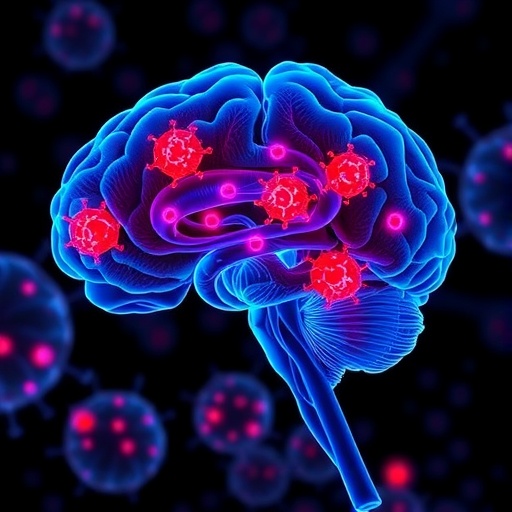In recent years, the intricate relationship between the gut microbiota and systemic health has become a focal point of biomedical research, linking microbial communities to a diverse spectrum of diseases. Although the gut microbiome is well-established as a pivotal player in conditions ranging from inflammatory bowel disease to neurodegenerative disorders, the precise mechanisms by which these microorganisms influence inflammation beyond the gastrointestinal tract remain largely elusive. A groundbreaking study now sheds light on this enigma by demonstrating how gut-primed immune cells can spark inflammation within the central nervous system (CNS), despite the absence of microbes in this typically sterile environment.
The research, conducted in murine models, focuses on a specialized subset of CD4+ T cells that are specific for gut-colonizing segmented filamentous bacteria (SFB). These T cells, referred to as gut commensal-specific T cells (T_comm), undergo dysregulation during episodes of intestinal inflammation, such as those observed in inflammatory bowel disease and related pathologies. Remarkably, this dysfunction endows them with the ability to migrate into the CNS, an organ previously thought insulated from direct microbial influence, where they contribute to neuroinflammatory cascades.
.adsslot_TrDa3uNjvP{ width:728px !important; height:90px !important; }
@media (max-width:1199px) { .adsslot_TrDa3uNjvP{ width:468px !important; height:60px !important; } }
@media (max-width:767px) { .adsslot_TrDa3uNjvP{ width:320px !important; height:50px !important; } }
ADVERTISEMENT
Delving deeper into the molecular underpinnings, the study elucidates that T_comm cells instigate CNS inflammation through both IL-23 receptor (IL-23R)-dependent and independent pathways. The IL-23R-dependent mechanism involves the activation of an encephalitogenic program within T cells, driving their pathogenic potential. Concurrently, the production of GM-CSF proceeds independently of IL-23R signaling, underscoring the multifaceted nature of T_comm-mediated neuroinflammation.
A crucial effector population targeted by these dysregulated T_comm cells are microglia, the resident immune cells of the brain and spinal cord. Upon activation by currents of inflammatory cytokines, microglia adopt pro-inflammatory phenotypes that exacerbate neuronal injury and propagate CNS inflammation. This microglial activation represents a tipping point where peripheral immune dysregulation translates into central nervous system pathology.
Emerging from this work is a nuanced appreciation of how regulatory T cells, which normally suppress excessive immune responses, play a crucial restraining role. In the absence of functional regulatory T cells, T_comm cells escape immune checkpoints, gaining access to the CNS and unleashing inflammatory responses. This highlights the intricate balance between immune tolerance and activation in maintaining both intestinal and neurological homeostasis.
Moreover, the concept of molecular mimicry within the CNS adds a compelling layer to autoimmune disease models. It provides a mechanistic basis for how infections or microbial exposure in the periphery might precipitate autoreactive immune responses against central nervous system components, echoing theories proposed in diseases such as multiple sclerosis.
The study’s detailed interrogation of T_comm cell behavior also reveals potential therapeutic targets. Modulating IL-23R signaling or intervening in GM-CSF production pathways could offer strategies to stifle neuroinflammation initiated by gut-derived immune cells. Such interventions might benefit patients suffering from neuroinflammatory conditions that currently lack effective treatments.
From a broader perspective, these findings emphasize the significance of the gut microbiota as not merely a collection of commensals but as an active player orchestrating immune responses with far-reaching systemic consequences. As microbiome research continues to unravel complex host-microbe interplays, the delineation of immune cell trafficking and activation patterns provides vital insights into disease etiology.
The study also prompts a reevaluation of neurological disease pathogenesis, advocating for integrative approaches that consider the gut-brain axis as a dynamic immunological interface. Identifying early markers of T_comm cell dysregulation might enable preemptive strategies to mitigate or prevent neuroinflammatory damage.
This paradigm shift underscores the importance of maintaining intestinal immune equilibrium, where perturbations can ripple into severe consequences for distant organ systems. It opens the door to exploring microbiota-targeted therapies not only for gastrointestinal disorders but also for neuroimmune diseases.
In summary, this cutting-edge research delineates a novel mechanism through which gut-resident microbes indirectly provoke CNS inflammation by shaping T cell repertoires and functions. It bridges long-standing gaps in understanding how peripheral immune disturbances translate into central autoimmune pathology, paving the way for innovative clinical approaches.
As the scientific community delves deeper into the complexities of immune-microbiota interactions, these insights strengthen the notion that health and disease are inseparable from the microbial world within us. The study stands as a testament to the power of multidisciplinary research in unraveling the hidden connections that define human biology.
Subject of Research: The interplay between gut microbiota-specific CD4+ T cells and neuroinflammation in the central nervous system.
Article Title: Gut inflammation promotes microbiota-specific CD4 T cell-mediated neuroinflammation.
Article References:
White, Z., Cabrera, I., Mei, L. et al. Gut inflammation promotes microbiota-specific CD4 T cell-mediated neuroinflammation. Nature (2025). https://doi.org/10.1038/s41586-025-09120-w
Image Credits: AI Generated
Tags: CD4+ T cells rolecentral nervous system inflammationgut inflammationgut microbiota and systemic healthgut-commensal specific T cellsimmune system dysregulationinflammatory bowel disease linkmicrobiome influence on healthmucosal immunity and neuroinflammationneuroinflammation mechanismssegmented filamentous bacteriaT cell migration to CNS





